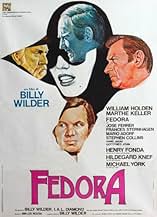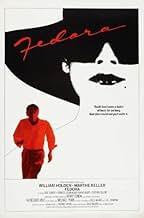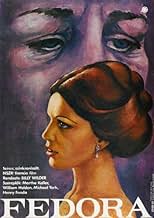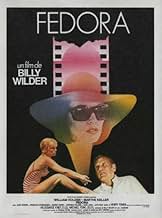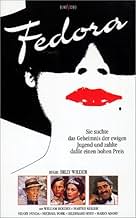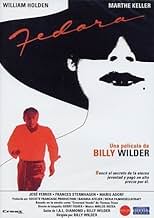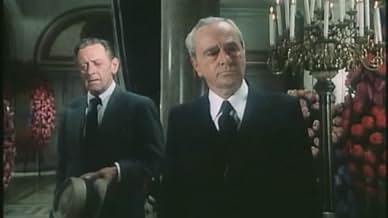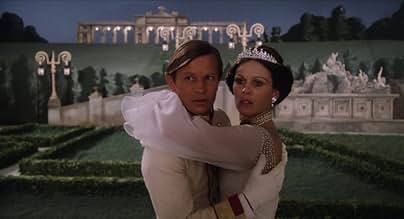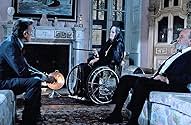AVALIAÇÃO DA IMDb
6,8/10
5,7 mil
SUA AVALIAÇÃO
Barry ''Dutch'' Detweiler, produtor de Hollywood, tenta atrair Fedora.Barry ''Dutch'' Detweiler, produtor de Hollywood, tenta atrair Fedora.Barry ''Dutch'' Detweiler, produtor de Hollywood, tenta atrair Fedora.
- Direção
- Roteiristas
- Artistas
- Prêmios
- 1 vitória e 1 indicação no total
Robert Cunningham
- Assistant Director
- (as Bob Cunningham)
- Direção
- Roteiristas
- Elenco e equipe completos
- Produção, bilheteria e muito mais no IMDbPro
Avaliações em destaque
"Fedora" was made with German and French money.It speaks volumes about what America thought of the commercial potential of one of its greatest directors.
As "Buddy Buddy" ,remake of a FRench comedy does not count ,"Fedora" is Wilder's last opus.And it is a good film,nay a splendid one regarded in context,the best last movie Wilder could make ,which is just as well ,because when epitaphs are seen as worthless,the things that came before can sometimes been retropectively tarnished by association."Fedora" stands in little danger to bring this about.It is a last film ,soon,like the others ,to yellow with age but never lose its poignancy.
Some said it was a poor man's "Sunset Blvd" .There are similarities: flashbacks,real-life actors (Cecil B.De Mille in "Sunset" Henry Fonda and Michael York" in "Fedora" ) and the terror of getting old ,the longing for eternity.There the comparison ends.
For "Fedora" was ,in 1978,a "modern" film which the European (notably the FRench critic) hailed as a young man's work."Fedora" is absorbing from start to finish:it is ,in turn,a romantic story (the affair with York) an investigation à la "Citizen Kane" ,a thriller and even a Gothic horror movie.William Holden,Hildegarde Knef , Swiss Marthe Keller,Mario Adorf and Jose Ferrer are all excellent.
The first scene when the heroine throws herself under the train recalls the techniques of the forties/fifties .Whereas "Fedora " is a thoroughly modern film,it manages to display nostalgia for the things we lost when the cinema began to lose its innocence or became intellectual or "got small!"The same nostalgia we felt in "Avanti" .The luminous blue Mediterranean sky is in direct contrast to the darkness of Wilder's earlier films noirs.
With "Fedora" Wilder came out blaring!
As "Buddy Buddy" ,remake of a FRench comedy does not count ,"Fedora" is Wilder's last opus.And it is a good film,nay a splendid one regarded in context,the best last movie Wilder could make ,which is just as well ,because when epitaphs are seen as worthless,the things that came before can sometimes been retropectively tarnished by association."Fedora" stands in little danger to bring this about.It is a last film ,soon,like the others ,to yellow with age but never lose its poignancy.
Some said it was a poor man's "Sunset Blvd" .There are similarities: flashbacks,real-life actors (Cecil B.De Mille in "Sunset" Henry Fonda and Michael York" in "Fedora" ) and the terror of getting old ,the longing for eternity.There the comparison ends.
For "Fedora" was ,in 1978,a "modern" film which the European (notably the FRench critic) hailed as a young man's work."Fedora" is absorbing from start to finish:it is ,in turn,a romantic story (the affair with York) an investigation à la "Citizen Kane" ,a thriller and even a Gothic horror movie.William Holden,Hildegarde Knef , Swiss Marthe Keller,Mario Adorf and Jose Ferrer are all excellent.
The first scene when the heroine throws herself under the train recalls the techniques of the forties/fifties .Whereas "Fedora " is a thoroughly modern film,it manages to display nostalgia for the things we lost when the cinema began to lose its innocence or became intellectual or "got small!"The same nostalgia we felt in "Avanti" .The luminous blue Mediterranean sky is in direct contrast to the darkness of Wilder's earlier films noirs.
With "Fedora" Wilder came out blaring!
Billy Wilder is celebrated for a streak of movies that starts with the groundbreaking film-noir "Double Indemnity" and "Lost Weekend" and ends with the comedy classics "Some Like it Hot" and "The Apartment". In between, you have such titles as "Sunset Blvd.", "Stalag 17", Sabrina" and "Witness for the Prosecution", I guess if any movie lover was asked about the 10 greatest movies from the Golden Age, a fistful of Billy Wilder films would be mentioned.
This is just to say that this is the kind of legacy a foreign director, who escaped from the Nazis and never got rid of his German accent, can be damn proud of, he literally owned American cinema and defined many genres. After the sixties, he still had a share of enjoyable movies but they never reached the same iconic status. And when the New Hollywood was built on the ruins of the studio system, Billy Wilder became the incarnation of old school, conventional cinema: big names, big stars and big stories. Wilder's motto was "thou shall not bore the audience" but then came a time where moviegoers, mostly grown-up baby boomers, were enthralled by the spectacle of Bonnie and Clyde's machine-guns, the French Connection' chase, Scorsese's mean streets and the intimacy of the Corleone family. Wilder became the bore, audience-wise.
"Those kids with beards are running things" laments the has-been Larry Detweiller aka "Dutch" played remarkably by William Holden, and his words couldn't have echoed more Billy Wilder's resentment toward the new ways of Hollywood or what was left of it. In the midst of the raging bulls and easy riders' era, the merit of "Fedora" is to provide the interesting insight from a director of the old generation. When the time of Ford, Minnelli or Hitchcock was over, Wilder was still here and made one, deliberately conventional and classic move or movie, so against the current it was meant to fail. But now, after four decades, "Fedora" has aged surprisingly well. It's not a masterpiece but the story is likely to content the movie lovers we are.
In fact, it illustrates this quote from Jean-Luc Godard: "the best way to criticize a film is to make one". And Billy Wilder, adapting the novel 'Crowned Heads', paid a tribute to the Golden Age through the portrayal of Fedora, a star who used to be big but then saw her stardom fade, only to resurrect a few years after. When asked if there was any similarity between "Fedora" and "Sunset Blvd.", Wilder naively said no, but even though it wasn't intentional, one can't have a cinema-themed Billy Wilder's film, featuring William Holden, much more in the narrator's role, and not have "Sunset Blvd." in mind. If anything, the film comes full circle with the classic noir: in the 70's, the Golden Age was the silent era, they didn't need blazing guns and naked breasts, only dialogues and faces.
Fedora was the biggest of her time, mentioning real-life stars and fictional movies as if the film was set in a parallel universe yet close to the reality, just like Norma Desmond interacting with Cecil B. De Mille, as to emphasize the dream-like aura of Hollywood. Then she abruptly ended her career and lived in in remote locations on the Riviera and started to make movies again after a few years of absence, this is where Dutch comes, trying to approach her to star in an adaptation of Anna Karenina, He notices some strange happenings, Fedora seems imprisoned by a group of people as colorful as intimidating: an old Countess with a husky voice (Hildegard Knef), a mysterious plastic surgeon played by Jose Ferrer and a sinister watchdog played by Frances Sternhagen (she was the sheriff's wisecracking wife in "Misery").
The "Sunset Blvd." déjà vu deepens and Dutch' investigation leads to the ultimate revelation about the story of Fedora. And it is intriguing and haunting within its own limitation with a fascinating mix of real actors like Henry Fonda and Michael York, in the intrigue. The main problem with the film is that the peripheral characters actually work better than the central one, Holden is perfect but like many critics pointed out, there had to be an actress of Marlene Dietrich' caliber to play the faded star because the flashbacks don't leave us with the conviction of a Golden Age aura on Fedora. There had to be a Katharine or Audrey Hepburn, Ingrid Bergman, but I guess the film was victim of its era, Wilder didn't have the same touch and only his old buddy William Holden was here to close the loop with "Sunset Blvd.".
But I love the way the film feels like a swan song of the old school and close the curtain on Wilder's five-decade contribution to Cinema, as if he was paying a final tribute to his art. He would later make a film with Lemmon and Matthau, a remake of a French classic farce but the film was of such abysmal quality it was dismissed as part of Wilder's canon, and "Fedora" is a worthy ending to his prolific career. I didn't necessarily enjoy the film, I would say I watched it with mere curiosity, able to appreciate its intent more than its result, but the making of the film is very fascinating, seeing the old Wilder wrestling with the new system to get his film made, along with I.A.L Diamond, is a great lesson of humility and determination.
After knowing the truth about Fedora, which is a self-referential cased of Naked Empress, Dutch says it would make a better story than the one he had in mind; I guess the same goes with the making of 'Fedora',
This is just to say that this is the kind of legacy a foreign director, who escaped from the Nazis and never got rid of his German accent, can be damn proud of, he literally owned American cinema and defined many genres. After the sixties, he still had a share of enjoyable movies but they never reached the same iconic status. And when the New Hollywood was built on the ruins of the studio system, Billy Wilder became the incarnation of old school, conventional cinema: big names, big stars and big stories. Wilder's motto was "thou shall not bore the audience" but then came a time where moviegoers, mostly grown-up baby boomers, were enthralled by the spectacle of Bonnie and Clyde's machine-guns, the French Connection' chase, Scorsese's mean streets and the intimacy of the Corleone family. Wilder became the bore, audience-wise.
"Those kids with beards are running things" laments the has-been Larry Detweiller aka "Dutch" played remarkably by William Holden, and his words couldn't have echoed more Billy Wilder's resentment toward the new ways of Hollywood or what was left of it. In the midst of the raging bulls and easy riders' era, the merit of "Fedora" is to provide the interesting insight from a director of the old generation. When the time of Ford, Minnelli or Hitchcock was over, Wilder was still here and made one, deliberately conventional and classic move or movie, so against the current it was meant to fail. But now, after four decades, "Fedora" has aged surprisingly well. It's not a masterpiece but the story is likely to content the movie lovers we are.
In fact, it illustrates this quote from Jean-Luc Godard: "the best way to criticize a film is to make one". And Billy Wilder, adapting the novel 'Crowned Heads', paid a tribute to the Golden Age through the portrayal of Fedora, a star who used to be big but then saw her stardom fade, only to resurrect a few years after. When asked if there was any similarity between "Fedora" and "Sunset Blvd.", Wilder naively said no, but even though it wasn't intentional, one can't have a cinema-themed Billy Wilder's film, featuring William Holden, much more in the narrator's role, and not have "Sunset Blvd." in mind. If anything, the film comes full circle with the classic noir: in the 70's, the Golden Age was the silent era, they didn't need blazing guns and naked breasts, only dialogues and faces.
Fedora was the biggest of her time, mentioning real-life stars and fictional movies as if the film was set in a parallel universe yet close to the reality, just like Norma Desmond interacting with Cecil B. De Mille, as to emphasize the dream-like aura of Hollywood. Then she abruptly ended her career and lived in in remote locations on the Riviera and started to make movies again after a few years of absence, this is where Dutch comes, trying to approach her to star in an adaptation of Anna Karenina, He notices some strange happenings, Fedora seems imprisoned by a group of people as colorful as intimidating: an old Countess with a husky voice (Hildegard Knef), a mysterious plastic surgeon played by Jose Ferrer and a sinister watchdog played by Frances Sternhagen (she was the sheriff's wisecracking wife in "Misery").
The "Sunset Blvd." déjà vu deepens and Dutch' investigation leads to the ultimate revelation about the story of Fedora. And it is intriguing and haunting within its own limitation with a fascinating mix of real actors like Henry Fonda and Michael York, in the intrigue. The main problem with the film is that the peripheral characters actually work better than the central one, Holden is perfect but like many critics pointed out, there had to be an actress of Marlene Dietrich' caliber to play the faded star because the flashbacks don't leave us with the conviction of a Golden Age aura on Fedora. There had to be a Katharine or Audrey Hepburn, Ingrid Bergman, but I guess the film was victim of its era, Wilder didn't have the same touch and only his old buddy William Holden was here to close the loop with "Sunset Blvd.".
But I love the way the film feels like a swan song of the old school and close the curtain on Wilder's five-decade contribution to Cinema, as if he was paying a final tribute to his art. He would later make a film with Lemmon and Matthau, a remake of a French classic farce but the film was of such abysmal quality it was dismissed as part of Wilder's canon, and "Fedora" is a worthy ending to his prolific career. I didn't necessarily enjoy the film, I would say I watched it with mere curiosity, able to appreciate its intent more than its result, but the making of the film is very fascinating, seeing the old Wilder wrestling with the new system to get his film made, along with I.A.L Diamond, is a great lesson of humility and determination.
After knowing the truth about Fedora, which is a self-referential cased of Naked Empress, Dutch says it would make a better story than the one he had in mind; I guess the same goes with the making of 'Fedora',
The former successful and famous Polish actress Fedora (Marthe Keller) commits suicide at the Mortcerf Station, jumping off in front of a train. The broken Hollywood producer Barry 'Dutch' Detweiler (William Holden) attends the funeral at her house in Paris and recalls that he might have caused her death.
Two weeks ago, Dutch traveled to Greece Island of Corfu seeking Fedora out in the Vila Calypso, located in an isolated island owned by the bitter Countess Sobryanski (Hildegard Knef). Fedora has been living an unsocial reclusive life for the last years in the villa with the countess, the plastic surgeon Doctor Vando (José Ferrer) and her assistant Miss Balfour (Frances Sternhagen), since she abandoned the set of a film that she was shooting in London with Michael York.
Dutch brings the screenplay with a version of "Anna Karenina" to offer to Fedora, with the promise that investors would finance the film if Fedora accepts the lead role. Fedora, who is impressively young, is receptive to the offer, but the countess and the doctor tell that she is mentally unstable and paranoid and can not act again.
When Dutch discovers that Fedora will be secretly sent to a mental institution owned by Dr. Vando in Mortcert, he tries to rescue the actress from the island but he is hit on the head and faints with a concussion. One week later, when he awakes, he learns that Fedora is dead. Dutch travels to Paris and meets Countess Sobryanski that him the truth about Fedora.
"Fedora" is the swan song of Billy Wilder, with an engaging story; a complex screenplay and many twists about aging, selfishness and loss of youth and identity. The plot has many elements of "Sunset Boulevard", with a washed-up producer looking for a former glamorous Hollywood actress that surprisingly has not aged like she should and might represent his comeback to the glory. The secret about Fedora and her friends is unpredictable. My vote is eight.
Title (Brazil): Not Available
Two weeks ago, Dutch traveled to Greece Island of Corfu seeking Fedora out in the Vila Calypso, located in an isolated island owned by the bitter Countess Sobryanski (Hildegard Knef). Fedora has been living an unsocial reclusive life for the last years in the villa with the countess, the plastic surgeon Doctor Vando (José Ferrer) and her assistant Miss Balfour (Frances Sternhagen), since she abandoned the set of a film that she was shooting in London with Michael York.
Dutch brings the screenplay with a version of "Anna Karenina" to offer to Fedora, with the promise that investors would finance the film if Fedora accepts the lead role. Fedora, who is impressively young, is receptive to the offer, but the countess and the doctor tell that she is mentally unstable and paranoid and can not act again.
When Dutch discovers that Fedora will be secretly sent to a mental institution owned by Dr. Vando in Mortcert, he tries to rescue the actress from the island but he is hit on the head and faints with a concussion. One week later, when he awakes, he learns that Fedora is dead. Dutch travels to Paris and meets Countess Sobryanski that him the truth about Fedora.
"Fedora" is the swan song of Billy Wilder, with an engaging story; a complex screenplay and many twists about aging, selfishness and loss of youth and identity. The plot has many elements of "Sunset Boulevard", with a washed-up producer looking for a former glamorous Hollywood actress that surprisingly has not aged like she should and might represent his comeback to the glory. The secret about Fedora and her friends is unpredictable. My vote is eight.
Title (Brazil): Not Available
Billy Wilder revisits the territory of his Hollywood Babylon classic Sunset Boulevard, with the same male lead (William Holden) in an almost identical role as a washed-up screenwriter trying to get to a reclusive and mysteriously ageless one-time screen queen in order to pitch her a comeback script. Story elements include Oscar Wilde's Picture of Dorian Gray and (off-screen) the many mad-doctor yarns of the 1930s and 1940s in which Boris Karloff messes about with Things We Were Never Meant To Know. Looks great in a brittle and glitzy 1970s way, as befits its scornfully depicted international-rich-white-trash milieu. Essentially it's a sombre but humanistic sermon on the hopeless worship of physical youth and beauty: as a medieval English writer put it, "who sows hope in the flesh reaps bones". A very relevant film for our narcissistic times, its only big flaw is that it's a mighty chilly piece of work, easier to admire than to love.
A shamefully overlooked movie , it is Wilder's testament with a lot of attractive ingredients as brooding drama , thrills , sensitive theme , amazing twist finale, in a word , emotion . It deals with a washed-out producer : William Holden who attempts to hire an old star called Fedora : Marthe Keller , she is nowadays retired and living at a mansion in Corfu along with a cripple countess : Hildegard Knef , their assistant : Frances Sternhagen and a mysterious doctor : Jose Ferrer.
Dramatic and witty film about cinema world containing realism, illusion, a twisted love story and tragedy . A flashy film and cynical at times , compellingly made by the great maestro Billy Wilder , at his last feature along with Buddy Buddy, but Fedora only superficially does it resemble Sunset Blvd . Colorfully set on Corfu , including nice cinematography by George Fisher , but a perfect remastering being really necessary . It explores deeply the basis of the cinema by thought-provoking and deranged portrayals of tarnished stars and the disastrous attempts to make time stop , providing a narrative assurance beyond the grasp of most filmmakers today.
Accompanying by a sensitive and stirring musical score by classy composer Miklos Rozsa . This moving motion picture was stunningly directed by the great Billy Wilder , giving one of the most sublime achievements of the Seventies , though it failed at the international boxoffice . Wilder was one of the best Hollywood directors who made various masterpieces and with special penchant for comedy , such as : The Major and the Minor , The Seven Year Itch , Sabrina , Some Like Hot The Apartment , One Two Three , Irma La Douce , Kiss Me Stupid , The Fortune Cookie , Avanti , The Front Page . Although Wilder also made Film Noir and Dramas, such as : The Lost Weekend , Double Indemnity , Five Graves to Cairo , A Foreign Affair , Ace in the Hole , Stalag 17 , The Spirit of St Louis , Witness for the Prosecution , Fedora , among others .
Dramatic and witty film about cinema world containing realism, illusion, a twisted love story and tragedy . A flashy film and cynical at times , compellingly made by the great maestro Billy Wilder , at his last feature along with Buddy Buddy, but Fedora only superficially does it resemble Sunset Blvd . Colorfully set on Corfu , including nice cinematography by George Fisher , but a perfect remastering being really necessary . It explores deeply the basis of the cinema by thought-provoking and deranged portrayals of tarnished stars and the disastrous attempts to make time stop , providing a narrative assurance beyond the grasp of most filmmakers today.
Accompanying by a sensitive and stirring musical score by classy composer Miklos Rozsa . This moving motion picture was stunningly directed by the great Billy Wilder , giving one of the most sublime achievements of the Seventies , though it failed at the international boxoffice . Wilder was one of the best Hollywood directors who made various masterpieces and with special penchant for comedy , such as : The Major and the Minor , The Seven Year Itch , Sabrina , Some Like Hot The Apartment , One Two Three , Irma La Douce , Kiss Me Stupid , The Fortune Cookie , Avanti , The Front Page . Although Wilder also made Film Noir and Dramas, such as : The Lost Weekend , Double Indemnity , Five Graves to Cairo , A Foreign Affair , Ace in the Hole , Stalag 17 , The Spirit of St Louis , Witness for the Prosecution , Fedora , among others .
Você sabia?
- CuriosidadesPrior to a preview in Santa Barbara, United Artists had cut twelve minutes from the movie. Director Billy Wilder refused to allow any further cuts, and the screening went poorly, with the audience laughing during the wrong parts of the film.
- Erros de gravaçãoIn the opening scene set in France in 1977, a woman throws herself in the path of a steam train. The last steam locomotives on mainline French railways were withdrawn in 1974, so this could not have happened as shown.
- Citações
The Countess: Remember those days? Moral turpitude? You could have six husbands but you couldn't have an illegitimate child. Now you can have six children and no husband and who cares.
- ConexõesFeatured in Arbeiten mit Billy Wilder: Ein Gespräch mit Mario Adorf (2014)
Principais escolhas
Faça login para avaliar e ver a lista de recomendações personalizadas
- How long is Fedora?Fornecido pela Alexa
Detalhes
- Data de lançamento
- Países de origem
- Idiomas
- Também conhecido como
- Федора
- Locações de filme
- Madouri Island, Lefkada, Grécia(Fedora's private island)
- Empresas de produção
- Consulte mais créditos da empresa na IMDbPro
Bilheteria
- Orçamento
- US$ 6.727.000 (estimativa)
Contribua para esta página
Sugerir uma alteração ou adicionar conteúdo ausente


